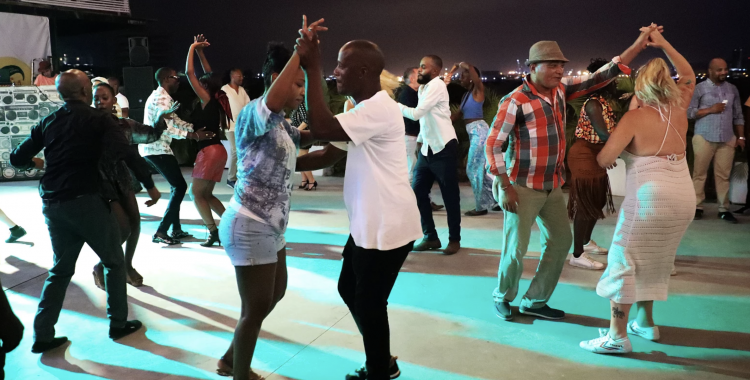It's dinner time and at Pé de Salsa some "passistas" are already emerging, alternating between the snack, the "lambreta" and a little dance in this open space overlooking the bay of Luanda, where illuminated skyscrapers give an additional shine to the festive atmosphere and disguise the poverty and neglect of the city.
With the decibels raised to the maximum, Natchova Hendrik, founder of the Péd'Salsa dance school, makes herself heard on the microphone and invites experts and beginners to participate in a first collective dance, synchronizing their bodies to the rhythm of salsa.
Many are foreigners who are learning to dance and have joined the kizomba craze, becoming regulars at the space, like the Italian Andrea Sacchi, financial manager at an oil company.
For the second time in Angola, after forays into other countries, she started dancing kizomba about a year ago and takes advantage of Wednesdays to practice.
"It's important to dance, especially kizomba, it's part of the culture and that's why I made a point of learning it, just like the language," the Italian, who also speaks Spanish and Russian, told Lusa.
For Andrea, "dancing is embracing culture" and, therefore, "being in Angola without dancing kizomba is like arriving in Italy and not eating pizza".
She says that kizomba is for everyone, foreigners and Angolans, with more or less skill: "Dance is a sport, you have to train but you can learn, because dancing doesn't just involve rhythm, you have to do the figures, the man has a role, the woman another".
She recently underwent surgery and still hasn't had his stitches removed, but he decided that the appeal of dancing was stronger than the medical recommendations: "They told me I couldn't, but this is a passion", she says, before heading to the dance floor.
Irene Sousa, resident in Angola since 2013 and director of operations at an educational institution, is another enthusiast.
"I've always liked dancing", highlights the 61-year-old Portuguese woman, who started kizomba in Luanda, in 2021, after attending a workshop in Portugal, where she already practiced ballroom dancing.
Kizomba emerged as a natural choice for those in Angola, highlights Irene, assuming a preference for African rhythms.
She started at a dance school, took private lessons and from there progressed to dancing "socially".
"Now I can go anywhere and not stay there (sitting)", she smiles.
She states that it is always easier to have a partner to "have a guaranteed dance", but those who are alone also easily find company among the members of Luanda's huge dancing community.
"People end up getting to know each other and dancing with each other", highlights Irene Sousa, who was enchanted by the rhythm and lyrics of kizomba.
"They talk about love and lack of love, about everyday life, I think they really reflect the soul of Angolans", she emphasizes.
Irene says that everyone can learn to dance, but admits that Angolans do it in a "more intuitive, more natural" way because they were born into kizomba, while foreigners have to learn and the movements are "more forced".
Natchova Hendrik, 48 years old, describes Pé de Salsa as a meeting of generations and social classes: "Everyone from the neighborhood kid to the minister comes here", highlights the dance teacher, trained in electrical engineering and who works in the oil industry.
"It's an environment that creates unity, interaction between various nationalities and where everyone feels good", says the head of the Pé de Salsa school, founded in 2005 and where many take their first steps in kizomba.
In the beginning, she says, it was mainly foreigners who came to the school, but nowadays more and more nationals come to Pé de Salsa because they want to improve their dance and steps.
"They are used to dancing at home, they learn from their families, but they want to have more technique", observes the promoter of Afro Latin nights.
Natchova emphasizes that you don't have to be African or Angolan to feel the rhythm: "Anyone can learn, the difference is that some are more used to the touch from a young age". A foreigner "may take a little longer at first", but he can dance from the moment he frees himself, she guarantees.
Californian Mariah Stacy came from Los Angeles and is in Angola for the first time, a country she discovered through Angolan friends and kizomba, which she has been practicing for over six years.
It's an "energy" that makes you "leave problems behind", she characterizes it.
The 26-year-old, a compliance analyst in the legal department of a company, is part of a group of 32 foreign women, of various nationalities, who share a taste for kizomba and came to live "a cultural experience" in Angola, marked by dance, music and history.
Mariah highlights the relationship between all these vectors and reports how she became increasingly immersed in Angolan culture as she danced and socialized with people from this country at parties, birthdays and other events, until she began to learn Portuguese.
"One thing led to another. I think my experience in Angola has been very different because I speak Portuguese", she tells Lusa, regarding "a beautiful day" spent in Kilamba, in which he attended a concert with renowned artists such as Yuri da Cunha, Ary and the already "kotas" – despite the band's name remaining – Jovens do Prenda.
Kizomba and semba were recently classified as Angola's national heritage and the Government is preparing the candidacy of these musical genres and dance styles as World Heritage Sites, inscribing them on the list of intangible heritage of the United Nations Educational Organization, Science and Culture (UNESCO).







